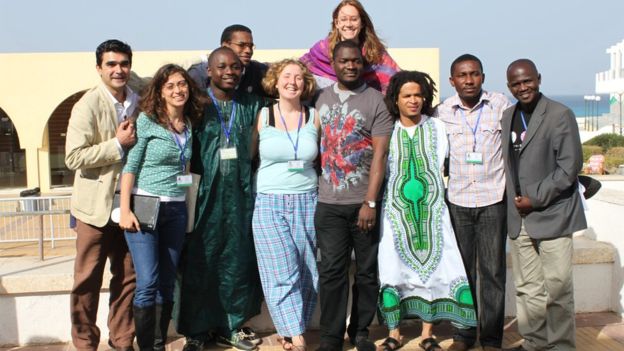During a 2007 “pilgrimage” to Serbia, I visited several towns on the outskirts of Belgrade. In each one, I got the impression that mine was the first (real) black face people living there had ever seen.
They invariably greeted me with stares, which made me feel like a Martian visiting Earth for the first time. But, on one occasion, a few schoolgirls completely disarmed me. They giddily approached and asked if I was some famous black guy they had seen on TV.
Naturally, I disabused them of that impression. Yet their curiosity was such that they proceeded to ask if they could take pictures with me, which led to them asking if they could touch my hair and skin. I happily obliged, which I think provided some consolation for the fact that I was not that famous black guy.
 I recounted this and other experiences in “My Serbian ‘Pilgrimage,’” May 30, 2007. I’m sharing it today because it helps me (and might help you) relate to a report the BBC published yesterday. It was headlined “How Nigerian singers are winning the hearts of Romanians,” and included the following:
I recounted this and other experiences in “My Serbian ‘Pilgrimage,’” May 30, 2007. I’m sharing it today because it helps me (and might help you) relate to a report the BBC published yesterday. It was headlined “How Nigerian singers are winning the hearts of Romanians,” and included the following:
The stares are from people trying to work out if he really is the Tobi Ibitoye who shot to fame, coming third on The Voice of Romania talent show in 2015. …
But Romania only has a very small African community, as most of those leaving the continent tend to head to Western European countries – generally to those with a colonial link.
It is estimated that over 90% of Nigerians living in Romania are university students, many of whom have come to study medicine, computer engineering or maritime engineering.
Interestingly enough, I’ve read many accounts of the Soviet Union treating Africans during the Cold War the way Romania seems inclined to treat them today.
The Soviet officials had clearly hoped that by bringing thousands of African students to the USSR they would score a major propaganda victory against their cold war rivals in the West and also consolidate their country’s prestige in the Third World.
However, they had failed to foresee the impact of African students on the Soviet society. Instead of serving as symbolic ideological allies of the regime, once in the Soviet Union, Africans often functioned as its opponents.
(Encyclopedia of Afroeuropean Studies)
This is why I wonder how long the infatuation between these Romanians and Nigerians will last.
After all, the novelty of a few black faces is bound to grow into a migration of many. At which point I fear the kind of disaffection and disillusionment African migrants are now experiencing in Russia:
In the Nov. 2 Section A, an article about hostility against African blacks in Russia said there had been 177 reported acts of violence against blacks in Russia since 2010, according to the SOVA Center for Information and Analysis. …
‘Most of the time I’m harassed, but this was the worst experience,’ Bazie, 28, said recently as he sat at a parish community center in Moscow where African migrants often seek refuge.
His story is not uncommon … African migrants face widespread hostility and racism that usually go unpunished.
(Los Angeles Times, November 2, 2014)
This constrains me to clarify that there’s nothing novel about Nigerian singers enjoying some measure of celebrity among Romanians (notably young women). For I’m reminded of the celebrity black singers like Sammy Davis Jr. enjoyed among whites Americans during the 1950s. That was the height of Jim Crowism when, as we all know, 99 percent of blacks were being treated more like Bazie than Ibotoye.
This is why it’s very likely that things are not all that rosy even for the small number of unsung Nigerians who are just trying to get an education in Romania today.
 What’s more, it’s worth reiterating that the Soviet Union recruited Africans for propaganda purposes, the fallout notwithstanding. Significantly, the USSR was the biggest benefactor of the African National Congress and trained thousands of the ANC’s militant members to fight the apartheid regime of South Africa.
What’s more, it’s worth reiterating that the Soviet Union recruited Africans for propaganda purposes, the fallout notwithstanding. Significantly, the USSR was the biggest benefactor of the African National Congress and trained thousands of the ANC’s militant members to fight the apartheid regime of South Africa.
By contrast, these Africans are in Romania today only because no Western European country wants them. This stems from the fact that, because so many African migrants preceded them, the influx of more became an untenable burden.
Europe is trying to cut the flow of migrants from Africa. …
Just as the European Union appeared to be stemming the flood of Syrian refugees last year, it realized that it had another, even more complicated problem on its hands: Migration from Africa was continuing to surge. …
Unlike Syrians, most of whom have viable claims to refugee status because of the war in their country, a large portion of Africans moving to Europe are economic migrants seeking better jobs.
(Washington Post, August 31, 2017)
This constrains me to end by noting that Africans ending up in Romania only compounds the continental shame I lamented in “African Migrants Turning Mediterranean Sea into Vast Cemetery,” February 12, 2015:
I just hope the damning irony is not lost on any proud African that, 50 years after decolonization, hundreds of Africans (men, women, and children) are risking their lives, practically every day, to subjugate themselves to the paternal mercies of their former colonial masters in Europe.
Related commentaries:
Serbian pilgrimage…
African migrants…
